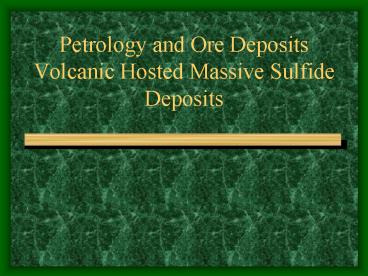Petrology and Ore Deposits Volcanic Hosted Massive Sulfide Deposits - PowerPoint PPT Presentation
1 / 15
Title:
Petrology and Ore Deposits Volcanic Hosted Massive Sulfide Deposits
Description:
These are an important group of hydrothermal deposits that form on the sea-floor ... this type have observed forming as hydrothermal vents (black smokers) on the sea ... – PowerPoint PPT presentation
Number of Views:1946
Avg rating:3.0/5.0
Title: Petrology and Ore Deposits Volcanic Hosted Massive Sulfide Deposits
1
Petrology and Ore DepositsVolcanic Hosted
Massive Sulfide Deposits
2
References/Links
- Web sites
- http//esa.www5.50megs.com/mindep/depfile/ma_sulp.
htmclass
3
Volcanic-associated Massive Sulfide (VMS) Deposits
- These are an important group of hydrothermal
deposits that form on the sea-floor often
referred to as VMS (volcanic-associated massive
sulfide) - They are typically conformable bedded in their
upper sections and epigenetic (stockwork) or
stratabound in their lower parts - Deposits of this type have observed forming as
hydrothermal vents (black smokers) on the
sea-floor at spreading centres
4
VMS Deposits
- Usually small 0.1-10 Mt but occasionally can be
very big rich eg Rio Tinto, Spain 500Mt _at_ 1.6
Cu, 2 Zn, 1 Pb, 67 g/t Ag, 1 g/t Au Rosebury,
Tasmania 19 Mt - Mineralogy usually consists of gt90 iron sulfide,
mostly pyrite with some pyrrhotite. Chalcopyrite,
sphalerite galena may be important constituents
depending on deposit class along with bornite,
chalcocite, arsenopyrite, magnetite - Most VMS deps are zoned. Galena and sphalerite
being more abundant in the upper half whereas
chalcopyrite increases toward the
footwall-staockwork zone
5
VMS-associated Wallrock Alteration
- Usually confined to the footwall-stockwork zone
- Chloritization and sericitization are the 2 most
common forms - Pipe shaped alteration usually containing the Cu
minzn - Diameter of alteration increases upward
6
VHMS Lifeforms
http//www.nature.com/cgi-taf/DynaPage.taf?file/n
ature/journal/v405/n6787/full/405676a0_fs.html
Figure 2 Remnant cores and bands containing
filaments. a, Silica-rich colloform cores
containing filaments, surrounded by replacive
pyrite (gold). Combined transmitted and reflected
light (TL and RL) photographic montage. b, Thin
banded layer containing filaments within
paragenetically early chert (TL and RL). c,
Detail of a showing the partial replacement of
quartz-rich colloform structures displaying
fine-scale lamination (TL and RL). Scale bar is
1 mm for a, b and 0.1 mm for c.
7
VMS Environment
- Cyprus-type Cu - Assoc with basalts at spreading
centres - Kuroko-type - assoc with intermediate-acid volc
rocks in island-arc environ termed
(Cu-Pb-Zn-Ag-Au). Occur with lg amounts of qtz,
barite and gypsum eg Woodlawn NSW, Hellyer Tas. - Besshi within plate back-arc rifting
8
VMS Classification
9
Black Smokers
10
VMS Formation
11
(No Transcript)
12
VMS Fluid Circulation
13
Stages of VMS Develop-ment Zoning
14
Spreading Centres (Cyprus-type VMS)
15
Tectonic Settings

